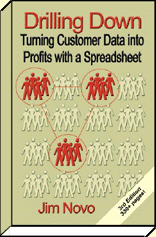Modeling Small Databases
Drilling Down Newsletter #93 10/2008
Drilling Down - Turning Customer
Data into Profits with a Spreadsheet
*************************
Have a question on Customer Valuation, Retention, Loyalty, or Defection?
Go ahead and send it to me here.
Get the Drilling Down Book!
http://www.booklocker.com/jimnovo
Prior Newsletters:
http://www.jimnovo.com/newsletters.htm
========================
Hi Folks, Jim Novo here.
This month, we're taking a trip into the world of small scale
databases. In particular, how does a not-for-profit with a small
database of donors go about using predictive models?
Over on the blog, the discussion continued on the current
state of the Online Marketing Model, what parts are broken, and how to
best integrate online and offline marketing.
The micro and the macro of Marketing Productivity, if you
will. Plenty of Drilling to do, so let's get at it.
Sample Marketing Productivity Blog Posts
==========================
Broken Online Model Endcap
October 8, 2008
This post is the last in a series on identifying the most efficient
roles online and offline media can play in an integrated marketing
plan.
The web is simply too expensive for the Awareness it delivers
because it is intentionally decentralized. The very essence of the web, what makes the web the web, is a poor structure for generating Awareness when compared with centralized media.
Other than for highly web-centric products and services, the web
should stop trying to create Awareness and focus on what it does best
- capitalizing on Interest, Desire, and Action.
Questions from Fellow Drillers
=====================
Modeling Small Databases
Q: I am new in the NFP (Jim's note - Not For Profit) sector and would like some advice re:
segmentation models to optimize campaign results - both response and value
(Short Term and Long Term). Do you know or is there any knowledgebase of how the various techniques - behavioural, RFM, demographic, geographic - generally
rate against each other?
A: Not other than my web site / book, which generally covers all the
simple models. There is plenty of info around on the web though.
Assuming the end Objective is a donation, the behavioral stuff is going to be much more productive than the geo / demographics are. It's like a
pyramid. My friend Avinash "stole" (with my
permission) a slide from my presentation on this topic and put it on
the web, you can see
it here. You're looking for an "action"
(donation), so actions (behavior) will be the most useful
segmentation, at least as a primary cut. Then you can get into
geo / demo stuff if it improves the model.
Q: As my database is small I don't have the luxury of testing multiple techniques and causal factors.
I will probably run tests in series but would like a general idea of which ones to test first to cut down the time.
A: Not sure what you mean by "small", but in general, the more complex a behavioral segmentation approach is the larger the database it needs to be useful.
So for example, with classic RFM (125
segment scores), the bare minimum for it to make any sense is probably 5000 records, and you should really have at least 10,000.
For your purposes, I would not try to "pick" a model but let the data
*show you* what the model should be by looking at history.
Find your best donors in the database, and then ask yourself how they are different from the rest of the donors.
Hopefully you have some records around of campaign history, so you might be able to tell when campaigns were run and line them up with when people donated.
If you don't have campaign history, that's fine too. Just try to get a sense of the "rhythm" of donation among best donors.
Once a year? Twice a year? In a particular season?
Do they cluster at all, is there more activity in the beginning, with a shorter space between
donations, and then this space begins to extend? If so, then Recency is probably in the driver's seat,
see this
blog post for more.
If the donations tend to be equidistant, then probably Latency is driving, though this could be corrupted by when campaigns drop - if your major campaign is "Holiday" every year in November / December, then the Latency you see could be just a result of campaign timing. Either way, when you find a pattern, then you test your ability to "bend it" in your favor.
With Recency, let's say best donors make 1st donation, then 2 months later make 2nd, then 3 months later make 3rd, then 6 months later make 4th. Can you get that 4th donation to happen 4 or 5 months after the
3rd instead of "waiting" for the 6th month?
For Latency, if the average best donor makes a donation every 5 months, can you shorten that to every 4 months, every 3 months?
This is where you may start to see some geo / demo come into play, for example, affluent zip codes.
Let's say you do a "best donor" test to try to "shorten" one of these time periods, and you get responses.
When you look at the respondents, you see they tend to cluster in more affluent zips.
Just another piece of the puzzle to take into account when you execute a "shortening" campaign.
If you see this kind of behavior among best donors in known zips, you can try to turn that inside out with an acquisition campaign to those zips.
When you're doing acquisition, of course, you don't have any "behavioral" so it's much more geo / demo driven.
The exception would be if you rented lists of known donors to other causes for those zips, which is a great idea if you can afford the list rental fees.
This previous donor info provides the known behavioral (action)
component you are missing when dealing with acquisition.
Hope that helps! No magic bullets with small databases, just a lot of hunting around and trying to see patterns in the data.
Good luck with it!
Jim
Have a question on Customer Valuation, Retention, Loyalty, or Defection?
Go ahead and send it to me here.
-------------------------------
If you are a consultant, agency, or software developer with clients
needing action-oriented customer intelligence or High ROI Customer
Marketing program designs, click
here
-------------------------------
That's it for this month's edition of the Drilling Down newsletter.
If you like the newsletter, please forward it to a friend! Subscription instructions are top and bottom of this page.
Any comments on the newsletter (it's too long, too short, topic
suggestions, etc.) please send them right along to me, along with any
other questions on customer Valuation, Retention, Loyalty, and
Defection here.
'Til next time, keep Drilling Down!
- Jim Novo
Copyright 2008, The Drilling Down Project by Jim Novo. All
rights reserved. You are free to use material from this
newsletter in whole or in part as long as you include complete
credits, including live web site link and e-mail link. Please
tell me where the material will appear.
| 
![]()
